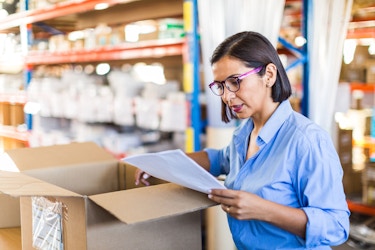
While the Economic Injury Disaster Loan (EIDL) program assisted small businesses during declared disasters such as the COVID-19 pandemic, as of this time, it is no longer accepting new applications from eligible businesses. However, there are a few other resources the Small Business Administration has available for businesses affected by disasters. Learn more about SBA disaster loans below.
Who is eligible for an SBA disaster loan?
SBA disaster loans are available for all for-profit businesses (regardless of size), nonprofit organizations, homeowners, and renters affected by declared disasters. Businesses and organizations that were impacted by “disasters,” including civil unrest as well as natural disasters like hurricanes, floods, and wildfires, are eligible for the loan.
[Read more: What is an SBA Loan?]
Types of SBA disaster loans
Physical damage loans
Those who have experienced physical damage to their home or personal property and live in a declared disaster area may be eligible for this SBA grant.
Eligibility is based on whether you rent or own your property. Homeowners can apply for up to $200,000 to repair or replace any damaged items or property for a primary residence. Renters may borrow up to $40,000 to replace or repair damaged personal property like clothing, furniture, cars, and appliances.
Mitigation assistance
Homeowners and small businesses can apply for low-interest disaster loans for those affected by declared disasters. Eligible applicants can choose to expand funding and protect their homes or businesses against future disasters by mitigating damages.
You can apply mitigation projects for the disasters such as wind, flood, wildfire, earthquakes, hail, and more. You can also use funds to strengthen physical structures, apply rooftop-mounted equipment, implement hail protection, and more.
SBA disaster loans are available for all for-profit businesses (regardless of size), nonprofit organizations, homeowners, and renters affected by declared disasters.
Economic Injury Disaster Loans
You may be eligible for an SBA Economic Injury Disaster Loan (EIDL) if you own a small business, agricultural cooperative, or private nonprofit organization located in a disaster area where you have suffered a substantial economic injury.
Eligible businesses include:
- Businesses that have been affected by a substantial economic injury to the extent that they cannot meet their obligations and pay necessary operating expenses.
- Small businesses that have been impacted by certain disasters and are unable to stay afloat until operations resume.
- Small businesses that the SBA determines are unable to obtain credit anywhere else.
Military reservist loan
The military reservist loan, known as the Military Reservist Economic Injury Disaster Loan (MREIDL), is for businesses that employ one or more military reservists called to active duty. The SBA will provide loans to eligible small businesses to support operating expenses.
The maximum amount of the MREIDL that a business can ask for is $2 million. The SBA calculates the exact amount that a business can ask for in relation to the actual economic injury. Businesses able to support their own financial recovery may not apply for this loan.
[Read more: Small Business Update: More on PPP Loans and the Employee Retention Tax Credit]
How to apply for an SBA disaster loan
Step 1: Visit the SBA disaster loan website and find your declared disaster area.
The SBA’s disaster loan assistance page provides an overview of the loan application and how eligible businesses can use the funds. If you are located in a state that has been impacted by a disaster declared by the Small Business Administration, the President of the United States, or the Secretary of Agriculture, you can find out whether your particular county or area is covered by a disaster loan here.
Step 2: Create an account and verify your identity.
You may complete an online application if your business is eligible for disaster assistance. You will be asked to create a Login.gov account to securely apply for the loan, where you will need to verify your identity using the following:
- A state-issued ID.
- Your Social Security number.
- A phone number on a phone plan that is associated with your name to receive a verification code.
Once you’ve verified your identity and personal details and secured your account, you may continue the online application.
Note: Before entering any personal or business information, be sure to confirm you are on the real Small Business Association site at SBA.gov.
Step 3: Complete the online application.
To complete this step of the online application, you will need several pieces of information pertaining to your business, including:
- The legal and trade names of your business.
- Your Federal EIN number or Social Security number.
- The date your business was founded.
- The number of employees you have.
- A personal financial statement.
- Schedule of liabilities.
- Your most recent federal tax return.
- Relevant business insurance policy information.
Depending on the specific loan you apply for, there may be additional information you will need to confirm. Be sure to thoroughly read the guidelines before submitting.
[Read more: Everything You Need to Know About SBA Disaster Assistance Loans]
CO— aims to bring you inspiration from leading respected experts. However, before making any business decision, you should consult a professional who can advise you based on your individual situation.
CO—is committed to helping you start, run and grow your small business. Learn more about the benefits of small business membership in the U.S. Chamber of Commerce, here.
Next Event: Tax Filing Tips!
Join us on Thursday, February 22, at 12 pm ET for the first episode of our expert series, Ready. Set. Scale.: Smart Tax Tips for a Stress-Free Filing. We will have seasoned leaders offering actionable tips to help minimize the stressors of tax time for small businesses.








